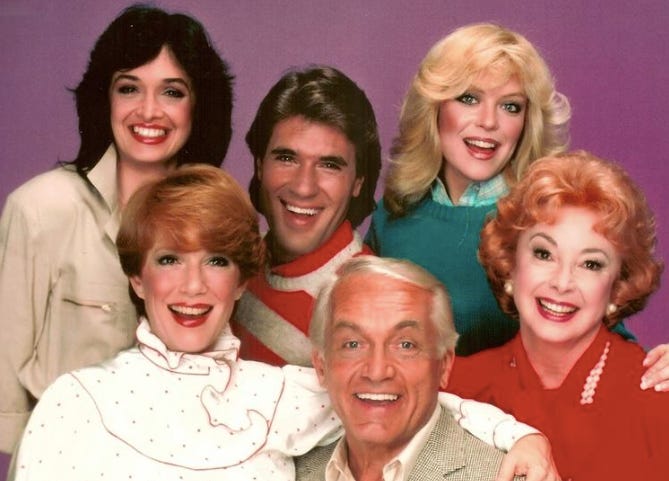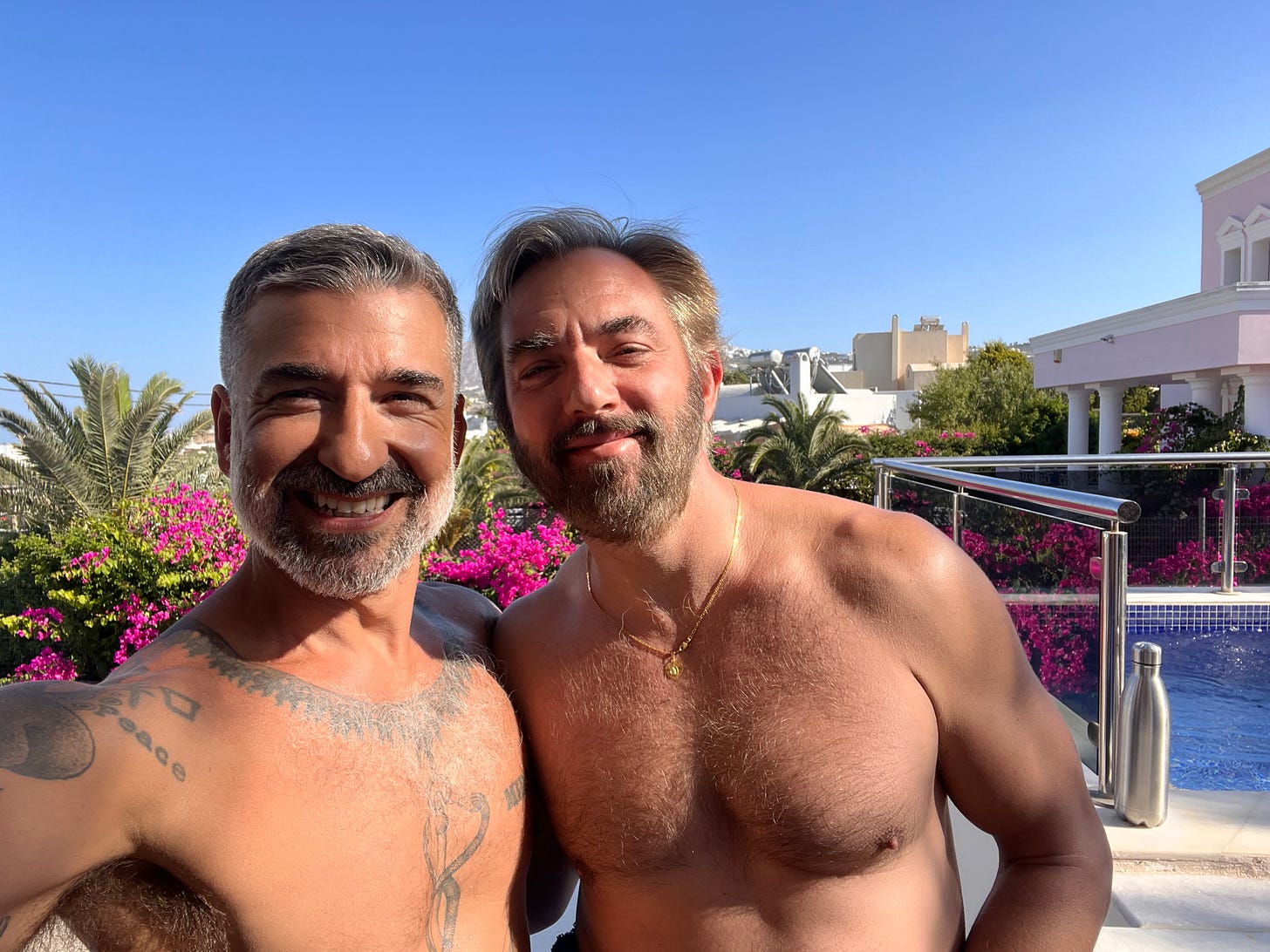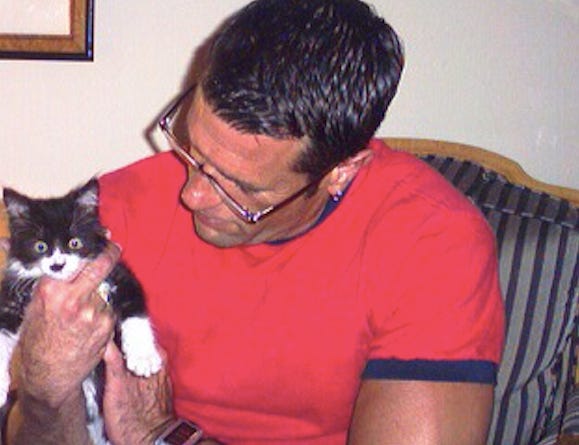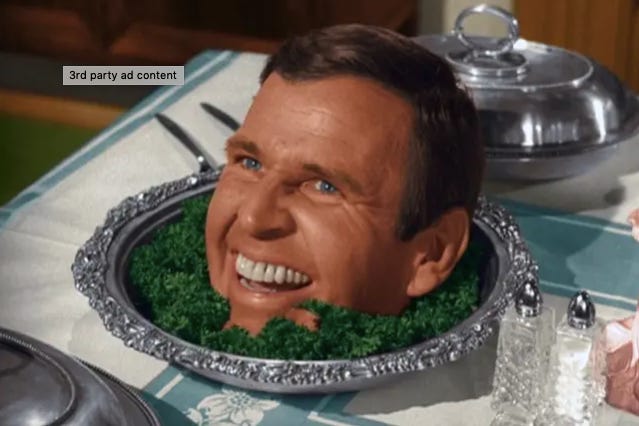Jim J. Bullock's Shame Got Too Close For Comfort. Then Things Got Better
The gay-ish goofball we all remember as Monroe from the silly '80s sitcom was indeed gay. And diagnosed with HIV in 1985. And deeply closeted. And then things got even more complicated...
Happy August, Caftan readers! I hope you’re all having a good summer, or as good a summer as possible. I was so (I hate this cliché, but…) #blessed to spend three weeks in Greece, both in Athens (a truly cool, vibrant and laid-back city that I will not linger in again in summer—it’s so hot!) and on some incredibly beautiful islands. And through it all, I was delighted to see Caftan readership skyrocket as my last interview with porn legend Tom Chase garnered more than 12,000 reads. That felt amazing!
But I have to admit that by Week Three of the Greek sojourn, being the write-aholic that I am, I was anxious to get back to NYC—partly to do the August interview. Let me introduce it by saying that, if there were a Gen X game show called “Name That Sitcom Voice,” where you had to identify a voice from the silly shows we watched as kids and teens—wait, is that Tootie from The Facts of Life? Boss Hogg from The Dukes of Hazzard?—wouldn’t we all immediately know the voice of Monroe Ficus from Too Close for Comfort? I mean, TCFC wasn’t even a favorite show of mine when I was in middle school—I was definitely team Facts of Life (especially when they went to Paris!)—but TCFC was always on in the background and there was Monroe, sorta gay-seeming and -sounding but maybe just a big doofus, in the inane way that sitcoms of that period really weren’t more sophisticated than old-fashioned, schticky vaudeville routines.
And of course there was also the nerd/hunk tension, because as much of a goofy, fumbling geek that Monroe was supposed to be, he was also, well, hunky, especially in those form-fitting rugby shirts.
Well, turns out that Monroe in fact was gay—that is, Jim J. Bullock, the Texas-bred actor who played him, was. But not only was he deeply closeted in the industry, he was also secretly living with HIV, convinced that if either or especially both secrets got out, his career would be ruined. (In fact, he was convinced that TCFC leading man and grand poobah Ted Knight would end it for him personally. And boy, does he have a heartbreaking anecdote to share about a smackdown with Ted he once had.)
It didn’t turn out quite like that. When TCFC ended in 1986 with Knight’s abrupt death from cancer, Jim’s career continued on The New Hollywood Squares (watch him at the 3:46 mark)…
…and Alf. He kicked off the nineties with a beautiful six-year relationship with another HIV-positive man, John Casey. But when John died of AIDS in 1996, that’s when Jim’s life really went haywire, with an arrest in 1999 for possession of crystal meth being only one of the bottoms he hit. It was good old-fashioned eight-shows-a-week stage work, starting with the role of Wilbur Turnblad in Broadway’s Hairspray, that saved Jim’s career—and maybe even his life. (He then went on to play Edna Turnblad, the role Harvey Fierstein created, in several succeeding productions; the clip below is of Jim as Edna in a 2011 regional staging of the musical.)
All of which brings us up to today, with Jim living relatively quietly in Palm Springs.
On August 8, Jim and I talked for four straight hours—okay, there were a few bathroom breaks—and I loved every minute of it. Even at 67 and after all his ups and downs, Jim to me still has the essence of a very sweet and earnest boy raised in the Baptist church who wants to make people happy and make them laugh. I had a lot of identity with his discovery, early on, that humor goes a long way toward being accepted—and also that, as gay boys growing up in a certain era, we desperately wanted to be accepted—by our fathers, by society—more than anything else. Jim’s story is studded with the campy celebrities of yesteryear, from Paul Lynde to Joan Rivers to Tammy Faye Baker. It’s a wild ride, and I loved that as effortlessly funny as he was, Jim was dead-honest with me about what was really going on in his head and heart through all of it. He shied away from (almost) nothing.
Enjoy the chat! I want to express a boatload of gratitude to all the subscribers, paid and otherwise, as this marks the first anniversary of The Caftan Chronicles. I have to pinch myself that exactly what I envisioned for this project—deep talks with gay men “of a certain age” about our undocumented collective history the past 50 years—seems to be coming true, and that people seem to be responding. Please consider subscribing at $5/month or $50 outright for the year if you haven’t. If you have—thank you! And do please continue to tell folks about Caftan!
See all you caftan queens in September! xo Tim
Tim: Jim! I'm so excited to talk to you.
Jim: I am too. And I love the name of your project. I go to the Methodist church here in Palm Springs and we have a very open and wonderful pastor named Jane who wears caftans every Sunday. I have a caftan in my closet too, but I've never worn it because it's from some part of the world where the men must be very small. I ordered an XXL, but it's still very tapered around the chest, and a caftan should be all about flowiness and hiding.
Tim: Yes—caftans should not be tapered.
Jim: I know! I wanted an Allen Carr [the gay producer of the movie Grease] caftan…
…but couldn't find one like that, and the women's ones are made out of plastic. Or nylon. And I'm not wearing my nylon in 115-degree heat. Maybe in January I'll wear it.
Tim: Yes. So Jim, describe your day so far, or a typical day for you in Palm Springs.
Jim: I'm an early riser. I normally get up at five, and if I don't, my cat, Lloyd, gets me up. He's 21—a miracle that he is still alive.
I had a cat for 18 years named Ethel who I had to put down. Then a year went by and I kept going by this cat shelter and they showed me Lloyd when he was a little baby kitten. They named him after [the 1920s film actor] Harold Lloyd. He likes to walk around outside, so I get my coffee and we do that until I'm like, "Bitch, hurry up, I'm hot." Then I just sit in my living room and tell Alexa to play nature noises and I sit here and have my coffee and maybe look at my phone.
Then, twice a week, I volunteer at Kittyland, a no-kill adult-cat rescue place. Adult cats don't get adopted a lot. I clean their boxes and scrub the floor and love on the cats. I love animals. I think we have a responsibility to take care of them.
Then I go to the gym, do the elliptical, then come home and have a big bowl of watermelon with salt, and also scrambled eggs and cottage cheese. My weight blew up during COVID but I've managed to take off 30 pounds. Then, if I weren't doing this interview, I'd go volunteer at a homeless feeding program or Habitat for Humanity, or I'd probably be thrift shopping. I love tchotchkes—but I'm not a hoarder!
Tim: Are you retired at this point?
Jim: No, but I'm not really actively pursuing work anymore. I do have an agent and manager, but truthfully, I've been away on tours over half of Lloyd's life and I'm not leaving him again until he goes, then I'll be able to work a little more.
Then every day at five p.m., I have two very large vodka martinis, lightly dirty, and popcorn, and watch the local news, then make my dinner and watch something like Better Call Saul or Downton Abbey, then I'm in bed by eight. I love the whole process of going to bed. I have a sleeping disorder, so I start with my edible gummy, then take a trazodone.
Then I'm on TikTok, that's my guilty pleasure. All the guys on there are so fucking beautiful with their shirts off, and they know it. Otherwise, I'm not on any social media. I was on Facebook for a while, but I got all these requests from people I didn't even know, so I just quit. Anyway, then I take half an Ambien, which knocks me out.
Tim: Have you had any recent gigs?
Jim: I did Kinky Boots at the Hollywood Bowl in early July, which was cool. I also closed out the national tour, in the role of Wilbur, which I did on Broadway. I did Wilbur Turnblad in Hairspray on Broadway in the 2000s, which was thrilling and opened up a whole new chapter in my life, and I did the show in 2011 in Denver and L.A. and on two gigs with Royal Caribbean. In the nineties, as my TV work petered out, theater became my avenue to make money.
Tim: This is a bit of a stock question for an actor, but what's the biggest difference between TV and theater?
Jim: Money. You just don't make TV money in theater unless you're a huge draw like Hugh Jackman. And eight shows a week is such a grind, the same thing over and over. Repetition bores me.
Tim: Okay, so let's go all the way back now. So you were born in 1955 in Casper, Wyoming, and then moved to the small town of Denver City, Texas, as a baby.
Jim: My dad worked in oilfields and so you went where the oil was, and we moved quite a bit. My eldest sibling is my sister, who is 18, then my brother Bob, who passed, then there's an 11-year break and then my brother Dan, who's two years older than me, and I'm the baby.

Tim: What were you like as a kid?
Jim: I was a sissy—a mamma's boy. Danny was the all-American boy who loved to hunt, fish and kill things, and I loved pretty things. I loved to go shopping and wear my mother's colorful blouses. I played with dolls and, remarkably, my parents allowed me to and even bought me a Chatty Cathy doll for Christmas. I got picked on a lot and called a faggot and queer.
Tim: Well, me too. How badly were you picked on?
Jim: It was mostly verbal. I was never beat up. I didn't even know why I was different! I loved the Monkees. My first 45 record was "Daydream Believer." I loved Lost in Space and totally connected to [the seemingly gay character] Dr. Zachary Smith…
…but as I got older, I thought, "I don't want to be him."
Tim: Hm, that's so interesting, as of course I want to talk to you a lot about old TV characters who read as gay, like Monroe on Too Close for Comfort [hereafter referred to as TCFC]. Did you think as a kid that Dr. Smith was gay?
Jim: No. But he was definitely a big ole grown up sissy man, and I didn't want to be that. But then cut to Paul Lynde as Uncle Arthur on Bewitched…
…whom I idolized. I got a lot of my humor from Paul Lynde.
Tim: Why did Dr. Smith repel you but you loved Paul Lynde?
Jim: I think Paul was really brilliantly funny. Dr. Smith wasn't funny or clever or witty, just an obnoxious queen. As a young boy, I didn't even know what "gay" was, but there was that thing, a connection you made with certain characters that I, in turn, had people tell me they had that connection with Monroe before they even knew their own sexuality.
Tim: Well, you are really getting to the nut of what I want to talk about, because TCFC was one of those early-80s sitcoms, like Diff'rent Strokes or The Facts of Life or Silver Spoons that was always on in the background when I was in junior high school, and I always sensed that Monroe was, if not gay, then, like a clown or a nerd or the butt of the joke, and that definitely struck a nerve with me, because I was all of those things. How did you understand Monroe? Was he gay to you?
Jim: Not at all. It wasn't like I created him or thought, "Oh, this'll be a good mannerism for him." How I played him is just what I went in with when I auditioned. Back in the late seventies when I'd first come to L.A. and was doing Godspell on stage, this crazy agent woman named JoAnn Kane asked me, "What do you want?", and I said, "I want to be on a sitcom." It just seemed tangible to me. She said, "If you want a sitcom, stand-up is the way in." So I did stand-up at the Comedy Store, which got me on contract with ABC, $20,000 for a one-year contract, and then they try to find a slot for you on a show.
So I went in and auditioned for TCFC and forgot about it. Cut to many months later, the agent says to me, "They're still looking for this Monroe guy." And I had lost weight! I was working as a delivery boy and I'd go to 7-11 in the morning and get a huge coffee and a king-size Snickers and then I'd take Dexatrim and tweak all day long and then come home and maybe eat a little chicken. And I lost 30 pounds from when they had first seen me and said, "He's too fat and he's gay." They didn't even read me the first time.
But when I finally read for him, they didn't tell me how to play him—they just let me go, and that's how I played him in the early episodes. As the years went on, my voice got lower, and they'd say to me, "Get your voice back up!"













